INDIA'S REFUSAL
most pregnant comment on India's rejection of the British plan for Indian self-government comes from Indians them- Mr. Rajagopalachari, a moderate among Congress leaders, that the recent discussions failed not on the question of e but on the Congress demand, radically opposed to the whole ce of the British plan, that a completely independent Indian ent should be set up not after the war, but now. "On this issue," says Mr. Rajagopalachari, "the negotiations finally down." On that hear Mr. Jinnah, President of the Moslem e."The Congress Party's aim," he declared on the same day, red to be to set up an irremovable Cabinet responsible to y but the majority. Such a Cabinet would be a Fascist Grand cit. The Congress Party's proposals for an interim Government -circuited all the paramount issues, and if they were accepted would sound the death-knell of the Moslems of India." That laration represents the situation as seen from the Moslem stand- at, but it is a true picture as seen from any standpoint. It es the facts as they art, almost precisely as Sir Stafford Cripps td them in his broadcast to the Indian people on Saturday. The 1, the Lord Privy Seal observed, of a Cabinet responsible to lody, irremovable by anybody, with its majority in a position to clime large minorities, had only emerged at the last moment ;. to Pt it would be a breach of all the pledges the British Government repeatedly given to the minorities.
le difference between the Congress Party and the War Cabinet— though the Moslem League also rejected the plan, it would hardly e been likely to do that if Congress accepted it—must be neither aerated nor underestimated. In one sense it is vital and funda- nal. The British Government offered India complete self- emment, coupled with the right of secession, under a constitution LS own framing—after the war. An immediate change to self- eminent, with the enemy actually bombarding India's coasts, was nissed in advance as impossible. Yet it is precisely this that sgress claims, and on this it has chosen to break. With all nity, except for the remaining months or years of war, to enjoy !Pendence in, Congress prefers to sacrifice all hope of an agreed lement rather than refrain from grasping at independence here now. What it demands, moreover, is not democracy but uchy. Self-government after the war would rest on an agreed Aitution, and the Executive would presumably be responsible to e elected assembly. Congress seeks to dispense with both those sallies, and subject India to an irresponsible Cabinet in which muld have much the largest party-representation. Such a lopment is impossible, and in displaying so conspicuous a lack
of realism the Working Committee of Congress has gone far to justify doubts regardine its ,capacity for, taking its share in the business of government. That it an unhappy conclusion, but it is not easily avoided. However, Japan wiltigke India a good deal to think of for some time besides constitutions, and no fault can be found with Mr. Nehru's appeal to his countrymen for national resistance. When that has been successful the question of India's future can be taken up again in an atmosphere clarified by the union of Britons and of Indians of all faiths and parties in a common ordeal. Hopes of agreed progress have been disappointed ; but at least there is no retrogression. Indians must now concert a plan among themselves. They can hardly expect the British Government to continue sub- mitting successive sets of proposals for their approval. .


























